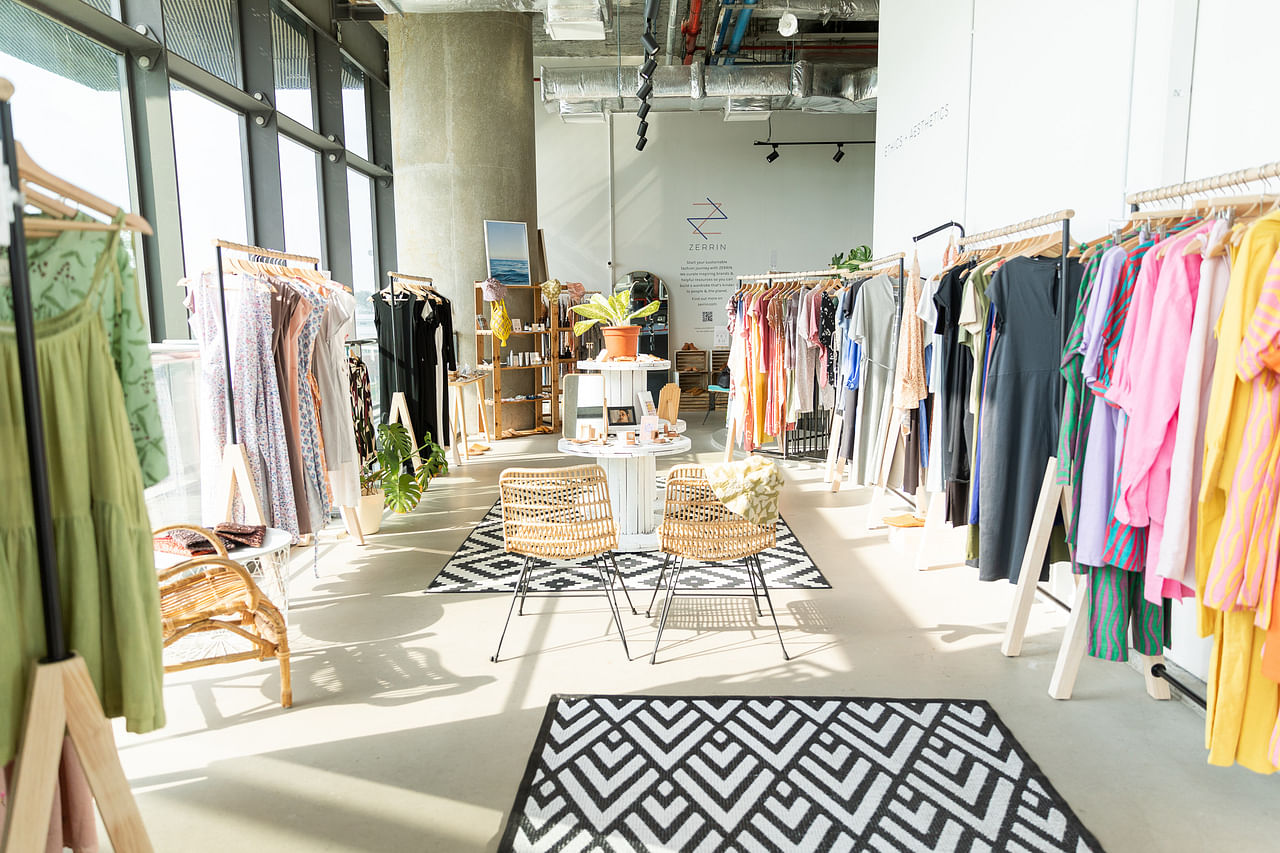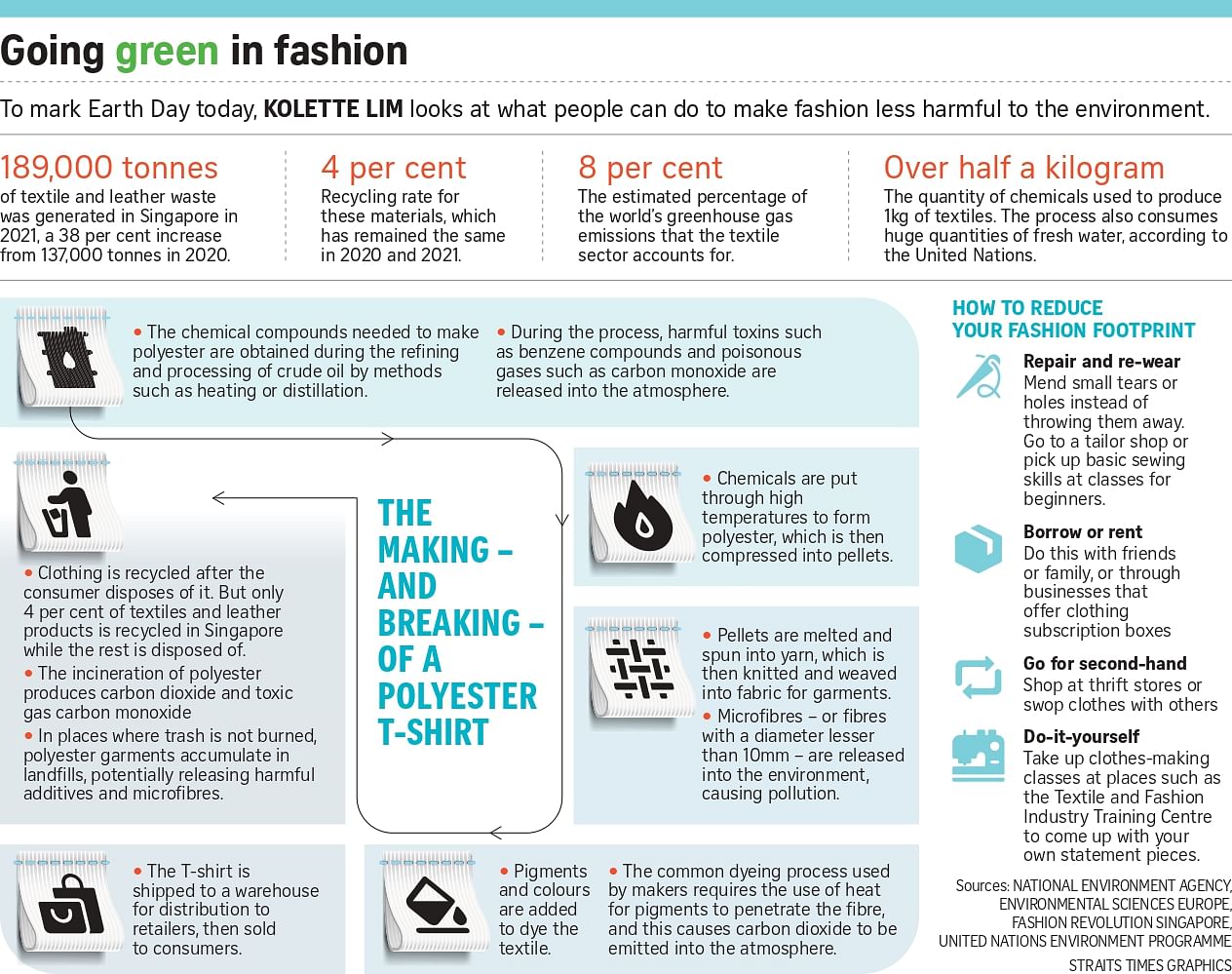Fashion Revolution Week aims to raise awareness of overconsumption, exploitation of natural resources
Sign up now: Get ST's newsletters delivered to your inbox
Follow topic:
SINGAPORE - Earth Day on April 22 is often marked across the globe with a slew of environment-protecting activities such as litter-picking and tree-planting.
For the fashion industry, the date coincides with the annual Fashion Revolution Week, which commemorates the 2013 Rana Plaza accident, in which 1,134 people died when a garment factory building collapsed in Dhaka, Bangladesh.
This year, the Singapore chapter of Fashion Revolution, the global activism movement and organisation, aims to raise transparency in the fashion industry by educating the public about the consumption-driven exploitation of natural resources.
The campaign, which marks the return of physical activities after two years of online ones due to the Covid-19 pandemic, began on Monday (April 18) and will end next Wednesday.
The public can take part in events such as workshops on stitching and upcycling - turning old or damaged clothes into new garments - and panel discussions on sustainable fashion.
Ms Shen Xingyun, Singapore's Fashion Revolution country coordinator, said: "(In Fashion Revolution Week), brands will be encouraged to shift their focus away from endless growth, and consumers will be urged to scrutinise the real value of what we buy."
Overconsumption, spurred by the rise of fast fashion and a lack of consumer awareness, is a significant contributor to environmental damage.
Dr Irene Huang, a lecturer from the Nanyang Business School in Nanyang Technological University, said shoppers are attracted by the frequent release of new items in fast fashion.
She said: "Take (online shopping platform) Shein as an example. It releases more than 5,000 new items every day, spoiling shoppers with choice and loyalty programmes that keep them coming back."
Mr Raye Padit, owner of clothing swop platform The Fashion Pulpit, said: "All we see is the glitz and glamour of fashion shows and models on social media platforms, but companies do not tell us how and where something is produced.
"We're just looking for what's next and following the trends. We now treat clothes as disposables."
Last year, households in Singapore generated 189,000 tonnes of textile and leather waste, a 38 per cent rise from the 137,000 tonnes thrown out in the previous year.

Zerrin carries sustainable and ethically conscious fashion brands.
PHOTO: COURTESY OF SUSANNAH JAFFER
But experts and industry players said sustainable fashion has been gaining traction, with retailers which offer eco-conscious options seeing more customers.
Ms Raena Lim, co-founder of apparel rental service Style Theory and resale shop Second Edit, said there was a tenfold growth in sales of second-hand clothings in the past year.
She added that as the pandemic forced people to work from home, consumers have become more conscious of their clothing consumption and waste.
Ms Susannah Jaffer, owner of sustainable retail boutique Zerrin, said the movement to promote sustainable fashion has been getting more support from local organisations such as the Textile and Fashion Federation.
Ms Susannah, a Fashion Revolution member, added: "It would be great if more designers, including fast-fashion brands, choose to engage in the conversation... More government support to drive awareness of what sustainability in fashion looks like can be quite pivotal."
Dr Sharon Ang, who heads the marketing division in Nanyang Business School, said the growing presence of sustainable fashion businesses can be because more people now do not see renting clothes and buying pre-loved apparel as signs of a person's financial difficulty.
She said: "With the advent of the sharing economy and sustainability movement, (renting and buying second-hand clothes) have taken on a new aura of being socially conscious and cool."
But sustainability enthusiasts said there is more to sustainable fashion than buying an organic cotton shirt. Taking proper care of clothes already in the wardrobe and prolonging their lifespan are other ways to consume consciously.

Poet Natalie Wang, 28, wears mostly pre-loved clothes that she buys from online marketplace Carousell and thrift shops, and borrows from her mother's wardrobe.
She said: "Making a habit of trying to fix things, even if it means going to a tailor to replace a zip, rather than throwing items out, is a good way to reduce your footprint. Learn to sew basic things to mend tears and fix buttons."
Ms Woo Qiyun, 25, a sustainability consultant, said she became aware that she was buying more than needed when she noticed she rarely wore most of the clothing in her wardrobe.
The climate activist said: "Whenever you buy something, make sure to ask yourself, 'Where did this piece of clothing come from?'"
To find out more about Fashion Revolution Week and its activities, visit the event's Facebook page.

